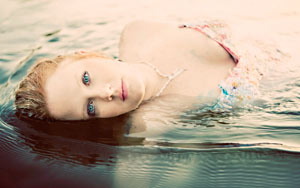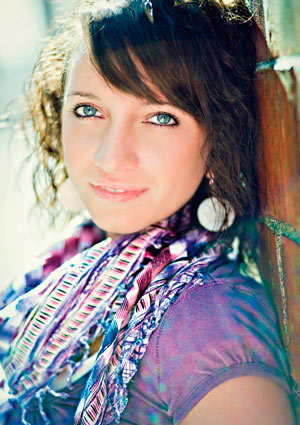articles/Profiles/speakerscornerkatietrujillo-page1
Speakers' Corner - Katie Trujillo - part 1 of 1 2
by Katie Trujillo Published 01/11/2010

Brief personal background and years as a pro.
I am based in Washington, USA and I have spent over 10 years managing stores and businesses in retail. I switched over to training employees and managers then finally found my real passion by running my own studio specialising in weddings and lifestyle photography.
First camera.
Growing up I shot a lot of photos with cheap film cameras.
Why photography?
You can look at a photo and wonder what was going on in that person's life, how they were feeling, the emotions they had. I decided that I was going to help people create pictures, showing the emotions they were feeling at the time. Not just posed portraits, but images that really let the emotion shine through.
Film/digital (both?) Is there still any place for film?
I shoot digital exclusively. I think there's a place for film in this industry, but for me I like the ease and accessibility of digital.
Capture and output devices used
I shoot with a Nikon D700 and prime lenses. The 85mm f/1.4, 50mm f/1.4 and 35mm f/2 are the ones I shoot with 95% of the time. I use Adobe Bridge to cull and sort my images and do basic batch editing and Photoshop CS5 for any creative edits. I'm a Mac girl, and do all my business related work on my MacBook Pro.

Bit of detail about your own studio set-up/staffing
I'm in between studio space right now, so I have a home office and shoot mostly on location. There are a few studios that I have access to if I need to do indoor studio work. I do most of the work myself. I edit my images and design my own albums. I tried outsourcing for a while, but it just wasn't for me.
The problem with professional photographers today is...
The lack of business skills. People should learn how to run a profitable business first, then focus on photography and the technical and artistic aspects of it.
The worst commercial errors you have made to date
I blogged recently about my business mistakes. They had to do with pricing, choosing vendors, underestimating time frames, and not knowing who my target client was.
How did you rectify them.
I price myself to include all the back end work I do. I choose my vendors very carefully. I always underestimate and over-deliver. Lastly, a wise person taught me, that I might not be the right photographer for every client. Ever since I've adopted that philosophy, I run into fewer problems.
Are you excited by the evolution of imaging?
I think it's great what we can do. Each of us has our own perspective and our own style. I've been to workshops where 20 different people were shooting the same thing, but not one of the photos looked the same. There were different perspectives, different angles, different processing. I find it invigorating that there's so much diversity.
Is it getting harder or easier to make a decent living?
In some ways I think it's harder. There are more photographers entering the industry with a dream of making a career out of it, there are more consumers having access to the same tools of the trade that pros use, but that just makes it that more rewarding when you do make a living.
In other areas I think it's easier. With Twitter, Facebook and forums, we as photographers can shoot almost anywhere and meet almost anyone. This is an incredible digital age we live in, and we as photographers can make the most of it.
You are currently on page 1 Contact Katie Trujillo
1st Published 01/11/2010
last update 09/12/2022 14:59:10
More Profiles Articles
There are 0 days to get ready for The Society of Photographers Convention and Trade Show at The Novotel London West, Hammersmith ...
which starts on Wednesday 14th January 2026





